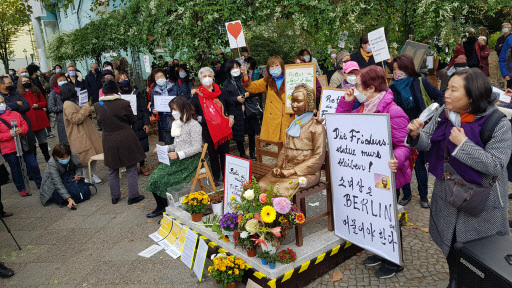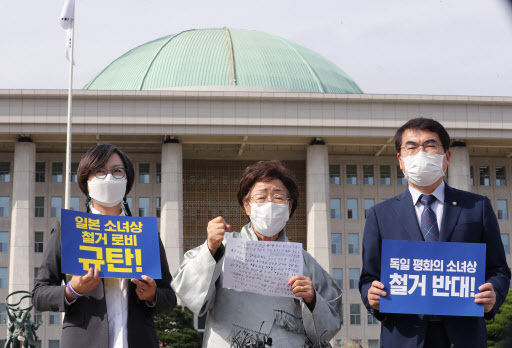Berlin’s district office defers order to remove Statue of Peace
Korean survivor of Japanese military sexual slavery demands that statue be allowed to stay
By Ock Hyun-juPublished : Oct. 14, 2020 - 18:09

A Berlin district office on Tuesday deferred its order to remove the statue symbolizing the victims of Japanese military sexual slavery, in the face of strong resistance from activists and citizens.
Reversing its earlier order to remove the Statue of Peace by Wednesday, the Mitte district’s office said the statue will remain for the time being until a court makes a ruling on a South Korean civic group’s request to invalidate the removal order.
Stephan von Dassel, district mayor of Mitte, expressed hope of a compromise that would fairly address the interests of both the Korean and Japanese sides, according to news reports.
“We will take time to thoroughly study the positions of all parties involved in this complex dispute, as well as our own position,” he said in a statement, adding that his district condemns all forms of sexual violence against women during armed conflicts.
Following Tokyo’s complaints about the statue, the Mitte district, which had initially permitted its presence for a year, announced last week that it had rescinded its approval.
Funded by a Seoul-based civic group, the Korean Council for Justice and Remembrance for the Issues of Military Sexual Slavery by Japan, Korea Verband set up the statue last month to raise awareness about wartime sexual slavery. It was the first Statue of Peace to be displayed in a public space in Germany.
Lee Yong-soo, a 91-year-old survivor of Japanese military sex slavery, said the statue should stay where it is in Berlin, which she called “the capital of the world’s conscience,” and condemned Tokyo’s diplomatic maneuvering to get rid of it.

“Germany, like Japan, was a defeated country in World War II. But unlike Japan, it is the country that has been at the forefront of atoning for its past history and getting straight the wrong history,” Lee said at a press conference Tuesday in front of the National Assembly in Seoul.
“The statue (installed) in Germany is not only for Korean victims, but also for victims from the Netherlands and (other parts of) Asia, so it definitely should remain installed in Berlin,” she said.
The Berlin district office’s decision angered many Koreans as well as peace activists, leading Korean Verband, a German-based civic group with Korean ties, to file for an injunction with the local court on Monday.
Petitions to keep the statue where it is also began circulating in Korea and in Germany.
On Tuesday, an estimated 300 people held a rally near the statue in Berlin to voice their opposition to its removal. Mitte district’s mayor also showed up at the rally and expressed hope of resolving the issue through dialogue.
“As we interpret it, the statue is about remembering and not repeating such war violence,” said Jung Sunkyoung, a Korean activist from the Korean Women’s International Network who was involved in having the statue placed there. “Separate from the court proceedings, we will continue to promote the statue as the Statue of Peace.”
The statue commemorates an estimated 200,000 girls and women, mostly from Korea, who were tricked or coerced into becoming sex slaves for Japanese troops during Japan’s 1910-45 colonization of Korea.
Historical issues, including the issue of the wartime sexual enslavement of Koreans by Japan, has long been a source of tension between Seoul and Tokyo. Their relations have been further strained since Korea’s top court in 2018 ordered Japanese firms to compensate Korean victims forced into factory work during Japan’s colonial rule.
(laeticia.ock@heraldcorp.com)
-
Articles by Ock Hyun-ju










![[Today’s K-pop] BTS pop-up event to come to Seoul](http://res.heraldm.com/phpwas/restmb_idxmake.php?idx=644&simg=/content/image/2024/04/17/20240417050734_0.jpg&u=)
![[Graphic News] More Koreans say they plan long-distance trips this year](http://res.heraldm.com/phpwas/restmb_idxmake.php?idx=644&simg=/content/image/2024/04/17/20240417050828_0.gif&u=)






![[KH Explains] Hyundai's full hybrid edge to pay off amid slow transition to pure EVs](http://res.heraldm.com/phpwas/restmb_idxmake.php?idx=652&simg=/content/image/2024/04/18/20240418050645_0.jpg&u=20240419100350)

